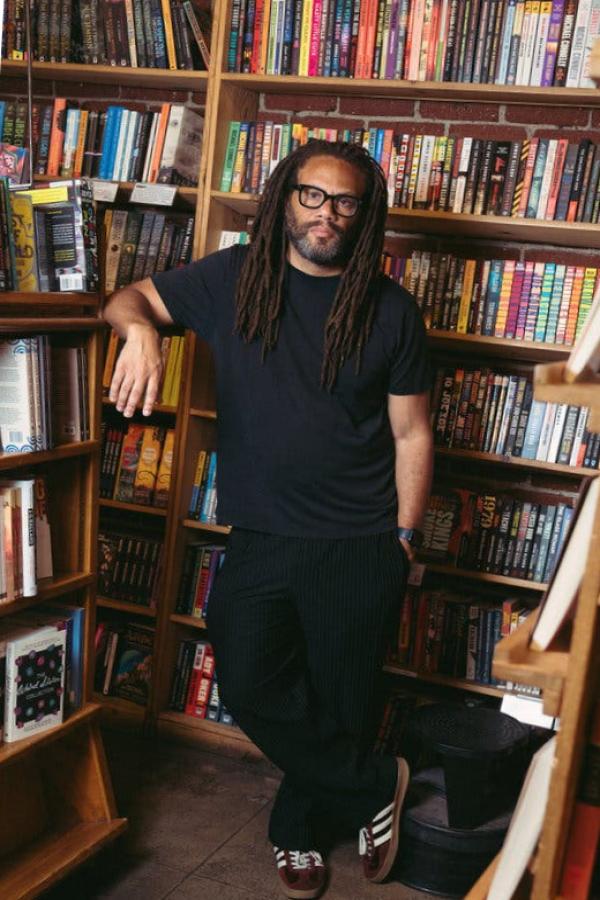Books
The Black List played a key role in changing the landscape of Hollywood. Is it possible for publishing to be transformed?
Almost 20 years after Franklin Leonard created the Black List, which has helped little-known screenwriters break into Hollywood, it is expanding into fiction.
Updated 2024-Sep-27 18:00

Franklin Leonard in a black shirt and pants poses for a portrait against bookshelves.
The Black List is collaborating with a production company Genre Films led by Simon Kinberg known for making movies such as The Martian and Deadpool.
Sarah Bowlin a literary agent at Aevitas Creative Management mentioned that the Black List could simplify the process of discovering new writers for her and other agents as opposed to sifting through unsolicited queries.
The company will select an unpublished manuscript to acquire rights to for $25 000 for a period of 18 months.
She also believes that the site s rating system will motivate publishers to take chances on new authors they may have previously ignored.
It might encourage publishers and editors to be more daring she explained. I am looking forward to being surprised by what is highly regarded.
Professionals in the publishing industry can request complimentary access to the website s content. Those who are given permission are able to look through manuscripts and explore works based on themes and subgenres.
Outstandingly rated novels will be featured in an email blast to industry subscribers and on the site s lists of top rated novels in various genres.
For nearly 20 years Franklin Leonard has made it his mission to help undiscovered writers find an audience.
In 2005 he started the Black List an annual survey of Hollywood’s best unproduced screenplays. Over the years the Black List evolved to include a website that has hosted tens of thousands of scripts TV pilots and plays and became an indispensable tool for studios and producers.
More than 400 screenplays that landed on the Black List’s annual survey have been produced including acclaimed films like Spotlight Slumdog Millionaire and The King’s Speech.
Now Leonard is tackling another industry in which writers struggle and mostly fail to break through: publishing.
He s adding novel manuscripts to the Black List aiming to crack the perennial problem of the slush pile.
Aspiring novelists can now post manuscripts on the Black List where they can potentially get discovered by the literary agents editors and publishers who subscribe to the site.
The goal Leonard said is to create a new avenue for authors whose work may have gone overlooked because they lack a literary agent or the right industry connections.
This lack of visibility he said has really negative consequences for the writers who are trying to get their work to somebody who can do something with it but also for the publishing industry itself because it’s not necessarily finding the best writers and the best books Leonard said.
Leonard has been thinking about adding fiction to the site for the past four years. After talking to dozens of publishing professionals he realized that some of the tools he developed for highlighting promising scripts and plays could also be used to showcase exciting unpublished novels.
He recruited Randy Winston the former director of writing programs at the Center for Fiction to oversee the Black List’s expansion into fiction and to assemble a team of readers with publishing experience to evaluate manuscripts.
Like screenwriters and playwrights who use the site fiction writers can create a public profile on the Black List for free.
They can post a novel length unpublished or self published manuscript on the site for a monthly fee of $30.
For $150 authors can get professional feedback on the first 90 to 100 pages of their novel from one of the Black List’s readers.
The Black List will not earn a percentage if a publisher purchases a novel from the site or have any ownership rights to the material according to Leonard.
Most of the company s income is generated from writers paying fees for reviews and submitting their work on the platform.
Some publishers and literary agents approached about the Black List branching out into fiction expressed hope that it would discover new talent.
Molly Stern the founder and CEO of Zando an independent publishing house mentioned that publishers and readers globally have been struggling to handle the influx of unsolicited material.
Monitoring Franklin s actions closely.
